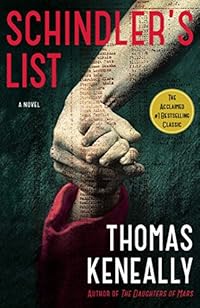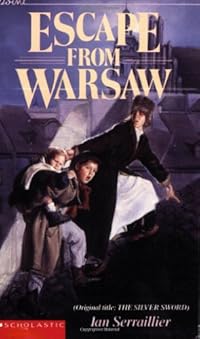Run, Boy, Run
by Uri Orlev
On This Page
Description
Based on the true story of a nine-year-old boy who escapes the Warsaw Ghetto and must survive throughout the war in the Nazi-occupied Polish countryside.Tags
Recommendations
Member Recommendations
Member Reviews
When eight-year-old Srulik’s family is killed by Nazis, he escapes into the Polish countryside, taking heed of his father’s direction to not let anyone know he’s Jewish. Although this is written for a younger reader and the pacing is very repetitive at times, I enjoyed reading about this young boy's experiences running from the Nazis in WWII Poland. The stakes are very high (life and death), and Srulik's persona is probable and likeable. The real clincher of the story is, of course, that it is based on a person that Uri Orlev met in real life.
Based on true events, Run, Boy, Run is gripping. The action never stops, and readers will be anxious to see what happens next. It is also quite emotional for the more sensitive reader. Older children will appreciate the complexity of the story, characters that are not necessarily “good” or “bad”. This book will have children making predictions about what will happen next, who Srulik/Jurek can trust, and what he should do to survive.
8 year-old Srulik Frydman, who is Jewish, must survive in war torn Poland, lie about his religion, change his name, and forget about his family. This award-winning fictional account of a young man’s extraordinary journey is both shocking and heart-felt. After getting separated from his mother in the Warsaw ghetto, Srulik leaves the city to survive in the countryside of Poland. The one thing he remembers is to stay alive – no matter what. Uri Orlev, a Holocaust survivor himself, has taken an innovative approach to the Jewish experience during WW II. He realistically portraits the experiences Srulik, now Jurek, endures. At times, he hides in the forest and steals sausages, or kills wild birds for a meal. At other times he is taken in show more by a farming family as a shepherd or hired hand. No place is permanent because he has to hide his heritage at any cost. Orlev explores the worst and best of human kind – from the kindness of Polish farmers, to the ruthlessness of the Nazi doctor who refuses to operate on Jurek’s arm. Jurek is beaten, is homeless and alone, and looses an arm; despite it all, the novel sends a message that regardless of the circumstances, the righteous soul of an innocent child will prevail over the darkest hand of evil. A novel about surviving against all odds that should be part of every Holocaust Unit, and one that everyone should read. 2003, Houghton Mifflin Co, $15.00. Ages 10 and up. Batchelder Honor Book.
Batchelder Award Winner show less
Batchelder Award Winner show less
A boy must forget his family and religion in order to survive the Nazi holocaust. He story tells of the horrors faced with limited graphic details. There is also hope and inspiration. Identifying circumcised males as Jewish may cause some confusion amongst young American boys since circumcision is so popular in America.
I’ve always been so intrigued with the holocaust and all the different books and movies produced by all these terrible experiences many people had to go through. This book specifically talks about a young boy who has to forgot his family and religion is order to survive the holocaust.
In this novel based on a Holocaust survivor's account, Srulik, a nine-year-old boy on the run in the Polish countryside, learns from his encounters with an assortment of strangers that he cannot reveal himself as Jew. Part of the strength of Orlev's writing rests with its spareness: like his protagonist, Orlev does not waste words; he resists embellishment. We learn what happens, but we must construct our feelings about those happenings for ourselves. "In daytime, he rarely thought of his friends or felt lonely. He was too busy looking for food and water and observing everything around him." A likable redhead, Jewish Srulik transforms himself into orphaned Christian Jurek, winning the hearts of the many Poles who decide to take him in. show more In a scene of surreal horror, Srulik sees his father hiding in a potato field, also on the run in the countryside. His father admonishes him to stay alive, to adopt Christian ways, to forget everything except that he is a Jew; his father then sacrifices his life to save his son's. Orlev shows the reader how well Srulik learns his father's lesson to stay alive, but also how resistant he is -- how painful it is -- to remember his Jewishness once the war ends. Orlev does not indulge us in feelings even when Srulik must have his arm amputated because a Christian doctor had earlier refused him treatment. Recounting how Srulik reconnects with his past and his Jewishness may be Orlev's greatest triumph in this novel of heartbreaking resilience.
Run, Boy, Run., By: Bloom, Susan P., Horn Book Magazine, 00185078, Nov/Dec2003, Vol. 79, Issue 6 show less
Run, Boy, Run., By: Bloom, Susan P., Horn Book Magazine, 00185078, Nov/Dec2003, Vol. 79, Issue 6 show less
Bel romanzo per ragazzi adatto anche agli adulti
Nov 12, 2009Italian
Members
- Recently Added By
Lists
A Child's Book Tour of Poland
35 works; 4 members
Author Information
Some Editions
Awards and Honors
Awards
Distinctions
Kirkus Reviews Starred Review (October 15 – 2003)
Booklist Starred Review (October 15 – 2003)
Notable Lists
Work Relationships
Has the adaptation
Common Knowledge
- Canonical title*
- Corri ragazzo, corri
- Original title
- Run, Boy, Run
- Related movies
- Run Boy Run (2013 | IMDb)
- First words
- It was early morning. The streets were empty. Duvid took his little brother by the hand and said, "Come on, Srulik, let's cross to the Polish side."
*Some information comes from Common Knowledge in other languages. Click "Edit" for more information.
Classifications
- Genres
- Fiction and Literature, Children's Books, Kids
- DDC/MDS
- 892.436 — Literature Other literatures Afro-Asiatic literatures Jewish, Israeli, and Hebrew Hebrew fiction 1947–2000
- LCC
- PZ7.O633 R — Language and Literature Fiction and juvenile belles lettres Fiction and juvenile belles lettres Juvenile belles lettres
- BISAC
Statistics
- Members
- 289
- Popularity
- 98,499
- Reviews
- 8
- Rating
- (4.00)
- Languages
- 8 — Catalan, English, French, German, Hebrew, Italian, Spanish, Swedish
- Media
- Paper, Audiobook, Ebook
- ISBNs
- 18
- UPCs
- 1
- ASINs
- 2































































